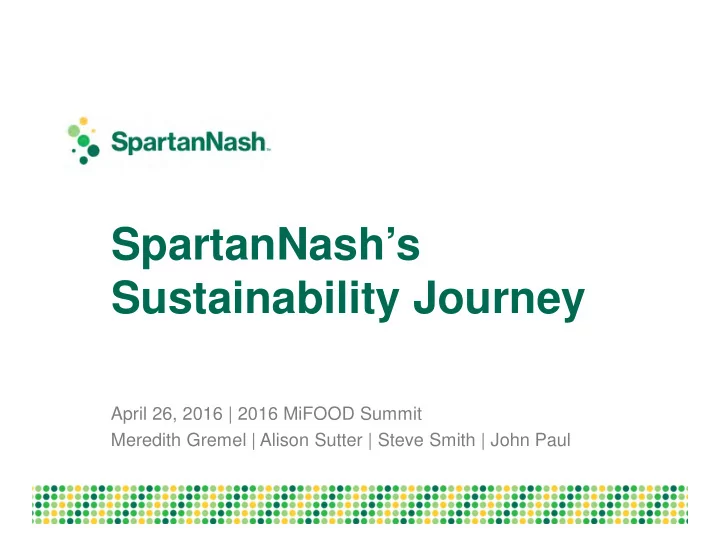

SpartanNash’s Sustainability Journey April 26, 2016 | 2016 MiFOOD Summit Meredith Gremel | Alison Sutter | Steve Smith | John Paul
First, our integration journey … + Spartan Stores TTM* Sales Nash Finch TTM* Sales Combined TTM* Sales Total:$7.5 Billion – Total: $2.6MM Total: $4.9B as of April 22, 2016 16% 29% 29% 43% 48% 57% 36% 42% Retail Distribution Military Retail Distribution Retail Distribution Military *TTM = Trailing 12 months
Food Distribution to 2,100 independent customer locations in 47 states 160 corporate owned stores in 10 states Minot MN 12 10 ND Fargo St. Cloud WI MI SD 5 6 91 Sioux Falls Grand Rapids 3 IA NE OH Omaha IN 28 3 Lima Bellefontaine 1 CO Cincinnati 1 Bloomington Landover Bluefield Norfolk Oklahoma City Lumberton Pensacola Retail Store Count by State # San Antonio Wholesale Distribution Centers MDV Distribution Centers Food Distribution Coverage
Our Military Operations
Global Military Distribution
Better together!
A best-in-class business that feels local, where relationships matter.
Corporate Responsibility … Why do we care?
� It’s the right thing to do. � Customer and end consumer demands and desires. � Associate recruiting, retention, engagement, and satisfaction. � Supports our vision ( best-in-class business, feels local, where relationships matter ). � Cost savings and revenue generating; increased financial performance. � Market differentiator, competitive advantage � Legal preparedness and regulatory compliance � It’s the right thing to do.
Dow Jones Sustainability Index Started in 1999, first global index tracking the financial performance of the leading sustainability driven companies worldwide
Corporate Responsibility Commitment Our social responsibility and Corporate Responsibility environmental sustainability programs make up our broader SpartanNash Corporate Social Responsibility commitment. Responsibility Financial Performance We understand that our business decisions, products and services, and our operations have a direct impact on the environment, our communities, Environmental customers and our associates. Sustainability
Potential Areas Environmental Sustainability of Focus Design & Construction Operations Merchandising Energy Sustainable Waste Private and Central Kitchen Efficiency & Siting Management National Brands & Deli Renewables Sustainable Water Environmental Local Design Management Compliance Products Sustainable Environmentally Sustainable Construction & Chemicals Preferable Products Renovation Purchasing Corporate Healthy Meetings & Climate Change Offerings Events Clean Labels IT Systems Transportation and Foods Private Brand Print Shop Packaging
Potential Areas of Focus Social Responsibility Store Associates Communities Vendors/Suppliers Guests/Consumers Corporate Corporate Animal Health and Foundation Community Culture Welfare Wellness Support HR Programs Financial Diversity and Diversity and Grants and Benefits Giving Inclusion Inclusion Diversity and In Kind Safe Working Food Safety Inclusion Donations Conditions Store and Health and Volunteering Customer Wellness Safety Occupational Animal Safety Welfare
Team Approach
LEED Certification Metro Family Fare and Metro Family Fare Fuel Center
Energy Efficiency
Fuel Center LED Lighting Conversion Of All Lighting To LED Savings 50% to 60% Of Electric Costs Number Of Fuel Centers : 22 Payback In Years : 3 ������������������ ������������ ������������������� ������ ������ ���������� ����������������� ����������������
Transportation Initiatives
Earth Week
School & Community Partnerships
Social Responsibility Customers | Co-workers | Communities
What is Double Up Food Bucks? The Double Up Food Bucks Program (DUFB) is a Fair Food Network (FFN) federally funded program that encourages SNAP/EBT customers to purchase fresh produce with their Bridge Card at grocery stores and farmers’ markets and rewards them with “free” produce. – http://www.doubleupfoodbucks.org/
Lakeview Family Fare (Battle Creek)
Animal Welfare Process No genetically engineered fish
Marketing Brand Strategy and Sustainability Steve Smith, Director, Brand Strategy April 26, 2016
Mission and Vision Mission: To leverage our expertise in food distribution and retail to develop, activate and provide impactful solutions that exceed expectations for associates, customers and partners. Vision: A best-in-class business that feels local, where relationships matter .
SN Retail Customer Promises • Low prices on the items you buy, and great weekly deals • Healthy food choices that fit your budget • Commitment to supporting local farmers, producers, and our communities . . . and a great shopping experience that makes you want to return
Approach to "Local” • Tier 1 = Locally Grown – Fresh: meat, seafood, dairy, produce, and floral (not bakery) – Grown: plant grew or animal was raised within defined “local” footprint – Ex.: farmers, greenhouses • Tier 2 = Locally Produced: Small Local Business – Businesses that only have manufacturing or processing operations within the defined “local” footprint – Ex.: Founders, Charley’s Chips, Zoye
Commitment to “Local” Farmers and Producers
Michigan “Local” Retail Campaigns
Non-Michigan “Local” Campaigns
Supporting Local Suppliers Video Link https://business.facebook.com/spartannash/videos/758042330962473/
Retail Health and Wellness Initiatives “Help me Feed my Family Well”
Recycling Centers
Private Brands Sustainability John Paul, VP Private Brands April 26, 2016
Sustainability - Food Safety and Quality • Risk Assessment Process – The risk level of an item determines testing frequency • Store Brand Source – Database for product specifications, details and manufacturer information – Provides control over the products we distribute – Contains information specific to sustainability • Retail Audits – Verification that we’re providing consumers with NBE products and high quality. • Global Food Safety Initiative (GFSI) compliance is a requirement for SpartanNash suppliers
Sustainability – Healthier Options • Distribute over 300 Full Circle items • Facts up Front • Product claims on packaging – Ex. No Artificial Growth Hormones in liquid milk • Implementing a “free from” ingredient list – 98% of products don’t contain trans fats – Removing Monosodium Glutamate – Reviewing the removal of synthetic colors by category
Sustainability – Packaging and Product Development • Packaging – Currently use recyclable and recycled packaging and content – The appropriate markings are placed on the packaging to alert consumers. – Avoid materials such as Bisphenol A (BPA) whenever possible • Development – Product Development Managers meet with manufacturers routinely to stay abreast of industry changes and to drive manufacturers on innovative opportunities in relation to sustainability. – Source USA products whenever possible
Recommend
More recommend